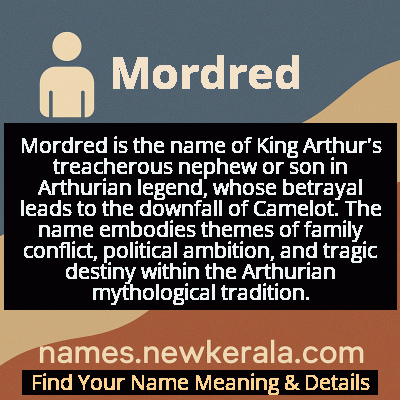Mordred Name Meaning & Details
Origin, Popularity, Numerology Analysis & Name Meaning of Mordred
Discover the origin, meaning, and cultural significance of the name MORDRED. Delve into its historical roots and explore the lasting impact it has had on communities and traditions.
Name
Mordred
Gender
Male
Origin
Arthurian
Lucky Number
5
Meaning of the Name - Mordred
Mordred is the name of King Arthur's treacherous nephew or son in Arthurian legend, whose betrayal leads to the downfall of Camelot. The name embodies themes of family conflict, political ambition, and tragic destiny within the Arthurian mythological tradition.
Mordred - Complete Numerology Analysis
Your Numerology Number
Based on Pythagorean Numerology System
Ruling Planet
Mercury
Positive Nature
Adventurous, dynamic, curious, and social.
Negative Traits
Restless, impatient, inconsistent, prone to indulgence.
Lucky Colours
Green, white.
Lucky Days
Wednesday.
Lucky Stones
Emerald.
Harmony Numbers
1, 3, 9.
Best Suited Professions
Sales, marketing, travel, entertainment.
What People Like About You
Versatility, charisma, adventurous spirit.
Famous People Named Mordred
Mordred Pendragon
Legendary Knight
Central antagonist in Arthurian legend who betrayed King Arthur
Mordred Le Fey
Literary Character
Complex anti-hero in modern Arthurian retellings
Mordred the Usurper
Mythological Figure
Symbol of betrayal in medieval romance traditions
Name Variations & International Equivalents
Click on blue names to explore their detailed meanings. Gray names with will be available soon.
Cultural & Historical Significance
Extended Personality Analysis
The name Mordred evokes a personality marked by deep complexity, intelligence, and tragic ambition. Characters bearing this name are typically portrayed as highly capable individuals whose talents are overshadowed by profound emotional wounds—often stemming from feelings of rejection, illegitimacy, or being denied their rightful place. This creates a personality driven by a desperate need for validation that manifests as strategic cunning, political ambition, and eventual betrayal. The Mordred archetype combines outward competence with inner turmoil, making him simultaneously threatening and sympathetic. His actions are rarely motivated by pure evil but rather by a complex mix of resentment, wounded pride, and a distorted sense of justice. This personality represents the danger of gifted individuals who feel society has wronged them, showing how intelligence and capability can be twisted toward destructive ends when fueled by bitterness and unmet emotional needs. The Mordred character serves as a reminder that the most dangerous adversaries are often those who understand the system they seek to destroy.
Modern Usage & Popularity
In contemporary naming practices, Mordred remains a highly specialized choice used almost exclusively within communities passionate about Arthurian legend, fantasy literature, or historical reenactment. The name's strong association with betrayal and tragedy limits its mainstream appeal, but it finds occasional use among parents seeking names with dramatic literary weight or who appreciate complex anti-hero figures. Modern usage often reflects attempts to reinterpret the character more sympathetically, viewing Mordred as a misunderstood figure rather than a pure villain. The name sees periodic interest following major Arthurian media releases but maintains niche status due to its heavy mythological baggage. It appears more frequently in fantasy gaming, historical fiction, and as character names in creative works than as given names in birth records, representing a choice for those who value narrative complexity over conventional positive associations.
Symbolic & Spiritual Meanings
Mordred symbolizes the inherent vulnerability of even the most perfect systems to internal corruption and family conflict. He represents the tragic irony that the greatest threat to Arthur's ideal kingdom comes not from external enemies but from his own bloodline—the son conceived through incest who ultimately destroys his father's legacy. Symbolically, Mordred embodies the consequences of secrets and illegitimate power, the destructive potential of neglected relationships, and the way personal failings can unravel political achievements. He serves as a metaphor for how utopian visions are inevitably compromised by human weakness and the unintended consequences of past actions. The name carries the weight of fulfilled prophecy and inescapable destiny, suggesting that some patterns of destruction are set in motion long before their catastrophic conclusions. Mordred represents the shadow side of nobility—the dark mirror that reflects the flaws and compromises necessary to maintain power.

